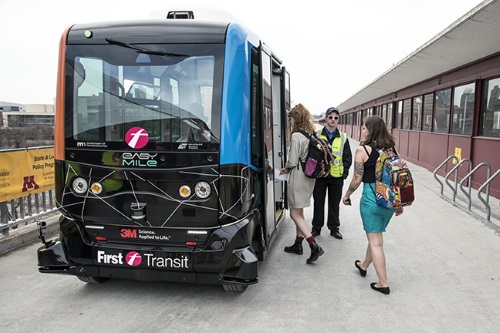The University of Minnesota received a three-year $1.75 million grant from the National Science Foundation on Oct. 5 to study the potential impact of fully autonomous vehicles on community “health, equity, livability, and prosperity” or HELP, with the Minnesota Department of Transportation tagged to be one of its “partners” in its research effort.
“The research will draw on innovative mobility field experiments underway in the Twin Cities region and will collaborate with several public, private and civil society partners,” noted Tom Fisher, a professor of urban design and a Center for Transportation Studies scholar, in a statement.

“These partners will include the cities of Minneapolis and St. Paul, the Destination Medical Center in Rochester, and the Minnesota DOT, the Metropolitan Council, and Metro Transit to design, plan, and analyze a shared autonomous vehicle system for greater community health, equity, livability, and prosperity,” he added.
Zhi-Li Zhang, a professor of computer science and engineering who is the lead researcher on the grant, said this research project will result in policy recommendations, design guidelines, and quantifiable information on the potential uses of autonomous vehicles and also envisions the creation of a “smart cloud commuting system” based on giant pools of data shared via self-driving vehicle operations.
“These smart cloud community systems have the potential to bring about far-reaching societal changes,” he explained, and would also provide more modal “equity” among local population groups as well as boost economic productivity.
[One way to do that is to build and deploy autonomous shuttle buses, which is something the university said it is already experimenting with, as seen in the video below.]
“Using autonomous vehicles will provide inexpensive mobility services to all people especially people with socio-economic disadvantages,” added Saif Benjaafar, a professor of industrial and systems engineering who is a co-director on this research project. “A system like this would help build stronger family and community ties, and boost economic productivity and equity by mitigating or removing mobility constraints.”
 Nation
Nation
Registration Open for 2026 AASHTO Washington Briefing
December 12, 2025 Nation
Nation

